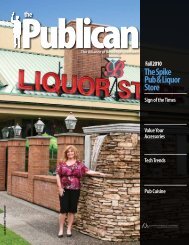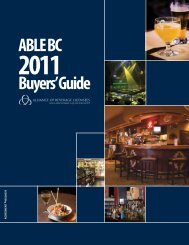Here - ABLE BC
Here - ABLE BC
Here - ABLE BC
Create successful ePaper yourself
Turn your PDF publications into a flip-book with our unique Google optimized e-Paper software.
If you own a pub, chances are you’ve considered<br />
using a daily deal website to attract more<br />
customers. Perhaps you’ve already run a daily<br />
deal offer (or a few) and survived to tell about it.<br />
While daily deals sound like an ingenious way to<br />
build your business - through massive exposure<br />
to drive lots of people into your establishment -<br />
the concept may have passed its peak having left<br />
many pubs burnt in its wake. It has also changed<br />
your customers’ buying behaviour forever (at least<br />
until the next fad).<br />
The daily deal phenomenon started in 2007 when<br />
Andrew Manson, Groupon’s founder, noticed<br />
that a social group he was in charge of was very<br />
active in organizing groups to take advantage<br />
of local businesses’ group deals. In 2008, he<br />
launched Groupon, which started the group<br />
buying craze that eventually evolved into the<br />
daily deal concept.<br />
The Rise of the Daily Deal<br />
At its height, group buying was huge; proving that<br />
cash-strapped, post-recession consumers loved<br />
discounted deals. In 2010, Groupon erroneously<br />
turned down a $6 billion ownership offer from<br />
Google, despite the fact that it hadn’t actually yet<br />
made a profit. The website had plans to launch its<br />
own IPO to go public on the stock market.<br />
Today, the company is worth less than Google’s<br />
initial offer, but may actually turn a profit for<br />
the first time in 2013. It has been busy using its<br />
revenue to cover overhead, marketing, growth,<br />
and acquiring smaller companies.<br />
Many copycat competitors have popped up using<br />
the daily deal model. Consumers can choose from<br />
at least ten daily deal websites in Vancouver alone,<br />
and there have been many more sites started, but<br />
they were weeded out by the marketplace.<br />
Why Did Daily Deals Have Such a Meteoric<br />
Rise?<br />
Daily deal site operators, confident in their<br />
ability to market to large audiences, saw dollar<br />
signs. Vendor businesses - particularly pubs and<br />
restaurants where there is high customer turnover<br />
- thought the concept would be good for a large<br />
infusion of cash and for finding new customers.<br />
Common reasoning for using a daily deal has<br />
been: “If I show them a good time and they like the<br />
food, they’ll come back for more. Hopefully they’ll<br />
even tell their friends who also love bargains.”<br />
Sound familiar?<br />
Customers - the true winners of the daily deal<br />
game (except when the deal is sold out) - are<br />
driving the daily deal industry; however, this<br />
exposure to a plethora of deals has now created<br />
a much savvier consumer.<br />
The main advantage of using a daily deal site<br />
is that your pub will get exposure to a highly<br />
desirable demographic. The numbers tell the tale:<br />
• 60% of daily deal site users are between 18 to<br />
34 years old.<br />
• The next biggest demographic is 35 to 55 years<br />
old.<br />
• 68% of all online shoppers subscribe to one<br />
daily deal site.<br />
• 46% subscribe to two.<br />
• Most people who bought a daily deal ended<br />
up buying at least three over the past year.<br />
Now that we’ve matured into the fifth year of<br />
daily deals, a lot has changed since the early days.<br />
When daily deals first came out, most businesses,<br />
particularly spas and restaurants, didn’t realize<br />
the true cost of running a daily deal campaign,<br />
and many of those vendors couldn’t afford to run<br />
them. Worse, many thought these were a source<br />
of additional revenue.<br />
Today, many restaurant associations strongly<br />
caution against daily deal sites, concerned that<br />
these coupons devalue the industry as a whole.<br />
Unfortunately, many owner/operators work alone<br />
or are new to daily deal sites and still use them.<br />
You can also add “desperate to stay afloat” owners<br />
into that mix as well.<br />
Consumers are now trained to look for businesses<br />
that offer the best (i.e. cheapest) deal. In the past,<br />
a vendor could expect a coupon user to spend<br />
20 - 30% over the value of the coupon; now,<br />
consumers are careful to only order the bare<br />
minimum to get the deal.<br />
The Split Revenue Model - How Daily Deals Work<br />
The concept of the daily deal is relatively simple. A daily deal site offers to sell your gift certificate or<br />
menu item at a discount, usually at 50% (or more) off the regular price. The site gets half the money<br />
from the sale of the coupon, with the other half going to you. This essentially means you are selling<br />
your regular service at 25%, which often means a loss to the business owner.<br />
The biggest advantage to doing a daily deal offer is the massive exposure your brand could get with<br />
the right daily deal site. Consider the loss to be a marketing expense.<br />
The Publican<br />
15









